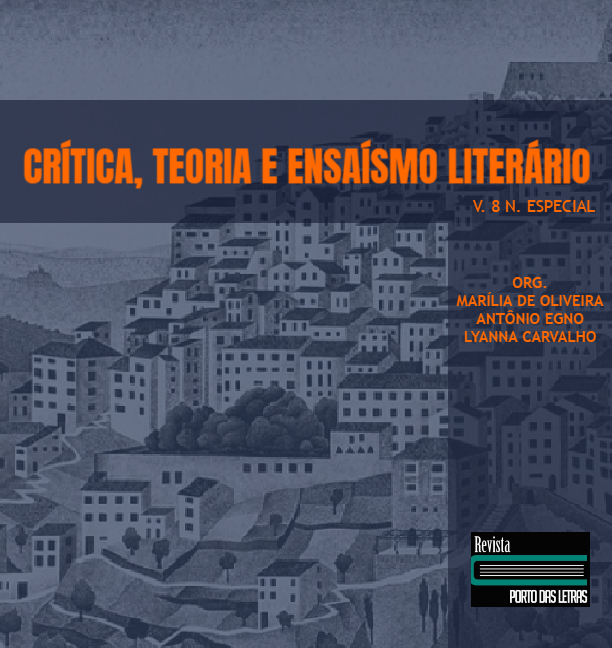“Eu sou aquela que chora”, ou o envelhecimento de Elizabeth Costello, de JM Coetzee
Abstract
As mudanças trazidas pela medicina, tecnologias e outras áreas do conhecimento deram origem ao que a Organização das Nações Unidas (ONU) (UNITED NATIONS, 2019) chamou de “revolução da longevidade” – a chegada do ser humano a uma segunda fase do envelhecimento, aquela dos muito-velhos, ou velhos-velhos. Apesar da grande população de sujeitos muito-velhos em nossa sociedade, estes pouco ou nada são representados na literatura ou nas artes, em especial quando se trata das perdas e ganhos na vida dessa parcela da população. Uma exceção é Elizabeth Costello, personagem criada por JM Coetzee, autor sul-africano radicado na Austrália. Ela surge já idosa e sua trajetória de jovem-velha para velha-velha é acompanhada em diversos contos do escritor. Neste artigo, trataremos das definições atuais de cada fase do envelhecimento e analisaremos a trajetória de Costello, bem como a maneira como sua representação foge às políticas sociais demandadas pelos especialistas em envelhecimento.
Literaturhinweise
BEAUVOIR, S. D. The old age. Nova Iorque: WW Norton & Company, 1996.
CHARLES, D. C. Literary old age: a browse through history. Educational Gerontology, v. 2, n. 3, p. 237-253, 1977. Disponível em: https://doi.org/10.1080/0360127770020304. Acesso em: 15 nov 2019.
COETZEE, J. M. Age of iron. Londres: Penguin Books, 1998.
___________. A vida dos animais. São Paulo: Companhia das Letras, 2003.
___________. Contos morais [título provisório]. São Paulo: Companhia das Letras, no prelo a.
___________. Desonra. São Paulo: Companhia das Letras, 2000a.
___________. Diário de um ano ruim. São Paulo: Companhia das Letras, 2008a.
___________. Diary of a bad year. Londres: Penguin Books, 2008b.
___________. Disgrace. Harmondsworth: Penguin Books, 2000b.
___________. Elizabeth Costello. São Paulo: Companhia das Letras, 2004.
___________. Homem lento. São Paulo: Companhia das Letras, 2007.
___________. Idade do ferro. São Paulo: Siciliano, 1992.
___________. Moral tales [título provisório]. [S.l.]: [s.n.], no prelo b.
___________. Siete cuentos morales. Barcelona/Buenos Aires: Penguin Random House, 2018.
___________. Waiting for the barbarians. Londres: Penguin Books, 1999.
COSTA, M. M. A. E. F. F. D.; HARDAGH, C. C. Cidades inteligentes são cidades saudáveis? Labor & Engenho, Campinas, v. 12, n. 4, out-dez 2018. DOI: https://doi.org/10.20396/labore.v12i4.8654327.
DUNCAN-JONES, K. (Ed.). Shakespere’s sonnets. Londres: Thomas Nelson & Sons, 1998.
FINNERAN, R. J. (Ed.). The poems of W.B. Yeats: a new edition. [S.l.]: Macmillan Publishing Company, 1968.
GULLETTE, M. M. Against “aging”: how to talk about growing older. Theory, Culture & Society, n. 7-8, dezembro 2017. Disponível em: https://www.theoryculturesociety.org/margaret-morganroth-gullette-aging-talk-growing-older. Acesso em: 10 nov 2019.
___________. Aged by culture. Chicago: University of Chicago Press, 2004.
___________. Ending ageism, or how not to shoot old people. New Brunswick: Rutgers University Press, 2017.
___________. Our best and longest-running story: why is telling progress narrative so necessary, and so difficult? In: ______ Agewise: fighting the new ageism in America. Chicago: University of Chicago Press, 2011.
KAFKOVÁ, M. P. The active aging index (AAI) and its relation to the quality of life of older adults. In: ZAIDI, A., et al. Building evidence for active ageing policy: active aging index and its potential. [S.l.]: Palgrave Macmillan, 2018. p. 55-74.
___________. The “real” old age and the transition between the third and fourth age. Sociológia, v. 48, n. 6, p. 622-640, 2016. Disponível em: https://www.researchgate.net/publication/311716743_The_Real_Old_Age_and_the_Transition_between_the_Third_and_Fourth_Age_1. Acesso em: 18 nov 2019.
MARSHALL, L. Through (with) the looking glass: revisiting Lacan and Woodward in "méconaissance”, the mirror stage of old age. Feminist Formation, 01 jan. 2012. 52-76.
PRENSKY, M. Nativos digitais, imigrantes digitais. On the horizon, v. 9, n. 5, out 2001.
UNITED NATIONS. Our world is groing older: UN DESA releases new report on ageing. UN DESA Voice, Nova Iorque, outubro 2019. Disponível em: https://www.un.org/development/desa/en/news/population/our-world-is-growing-older.html Acesso: 10 nov. 2019.
WOODWARD, K. Aging and it’s discontents: Freud and other fictions. Bloomington: Indiana University Press, 1991.
___________. (Ed.). Figuring age: women, bodies, generations. Bloomington: Indiana University Press, 1999.
Downloads
Veröffentlicht
Zitationsvorschlag
Ausgabe
Rubrik
Lizenz
Os autores concordam com os termos da Declaração de Direito Autoral, que se aplicará a esta submissão caso seja publicada nesta revista (comentários ao editor podem ser incluídos a seguir).




